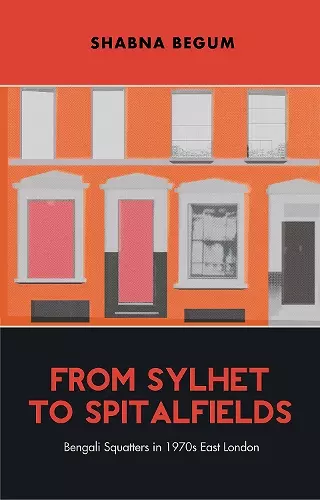From Sylhet to Spitalfields
Bengali Squatters in 1970s East London
Format:Paperback
Publisher:Lawrence & Wishart Ltd
Published:10th Mar '23
Should be back in stock very soon

'This important and inspiring book recovers the radical history of the Bengali squatters’ movement active in Tower Hamlets in the 1970s. Through sparkling vignettes of the individuals involved, Begum provides deep insights into the forms of solidarity that sustained the movement and the political differences that also characterised it. It’s a powerful contribution to working-class and multicultural histories of Britain', Gurminder K. Bhambra, Professor of Postcolonial and Decolonial Studies (Global Studies), University of Sussex; 'Shabna Begum has written a brilliantly nuanced and long overdue study of the Bengali squatters’ movement in 1970s London. Through foregrounding varied and vivid voices of Bengali women and men of different generations and experiences, she demonstrates how their claims to dilapidated houses, as they faced down violent physical and institutional racism, were integral to a shared struggle to establish their rights as equal citizens. From Sylhet to Spitalfields captures how the battles for housing of British Bengalis and their allies were, in different ways, framed by anticolonial imaginations and the Bangladesh Liberation War', Georgie Wemyss, Co-Director, Centre for Research on Migration, Refugees and Belonging (CMRB) at the University of East London; 'For too long, Britain’s postcolonial migrants have been neglected by histories of squatting and housing campaigns. From Sylhet to Spitalfields brings to life the community-based anti-racists that struggled for housing in East London, and a home in Britain. Begum’s moving accounts and sharp analysis are crucial for understanding how the right to housing is bound up with freedom from racism', Adam Elliott-Cooper, author of Black Resistance to British Policing, Manchester University Press, 2021; 'Begum covers a fascinating yet neglected aspect of British South Asian history. The book details, with great vigour, the necessary political activism Bangladeshi communities engaged in in the 1960s and 1970s to forge a better life for themselves and those who came after them. An engaging read, reflecting on and critically evaluating the historic political activism that has shaped the lives of British Bangladeshis in the present', Taj Ali, Industrial Correspondent at Tribune magazine; 'As a child of parents who made their first home in an East End squat and who were actively involved in this important but long overlooked social movement, Dr Shabna Begum’s book offers a compelling and long-awaited social history. A richly researched document, this book is not only an important historical record but gives a voice to the slowly forgotten activists who were in danger of becoming forgotten faces in fading photographs of the period. The struggle for equality took place with the backdrop of far right nationalism; Begum’s record reminds us how hard won some civil rights are. This book is a fitting testament to the struggles of a generation which was forced to appropriate a home out of necessity and neglect in the heart of Brick Lane, and from the humble origins of this squatting movement went on to build a key place in British society', Dr Halima Begum, CEO Runnymede Trust
This book explores the hidden history of the Bengali squatters’ movement. Faced with institutional discrimination in council housing and the existential threat of the National Front, hundreds of Bengali families in 1970s East London decided to squat, taking over entire streets and estates.With the support of the Race Today collective, squatters formed the Bengali Housing Action Group (BHAG), which organised support and vigilante groups to keep the community safe. Using oral history interviews and archival research, this book looks at the Bengali community’s contribution to this little-known episode of East End history, and how it can inform present-day housing struggles.
'This exploration of the Bengali squatting movement in 1970s Spitalfields does justice to its importance and also reveals its subtleties and complexities', Seán Carey, On London; 'a must for anyone interested in squatting, housing, racism, migration, oral history, London', Myk, Freedom News; 'an outstanding historical testimony laced with family autobiography', Chris Searle, Race & Class
ISBN: 9781913546748
Dimensions: unknown
Weight: unknown
232 pages